
The Cultural Revolution, formally known as the Great Proletarian Cultural Revolution, was a sociopolitical movement in China from 1966 until Mao Zedong's death in 1976. Launched by Mao, the Chairman of the Chinese Communist Party (CCP) and founder of the People's Republic of China (PRC), its stated goal was to preserve Chinese communism by purging remnants of capitalist and traditional elements from Chinese society, and to re-impose Mao Zedong Thought as the dominant ideology in the PRC. The Revolution marked Mao's return to the central position of power in China after a period of less radical leadership to recover from the failures of the Great Leap Forward, which caused the Great Chinese Famine (1959–61). However, the Revolution failed to achieve its main goals.
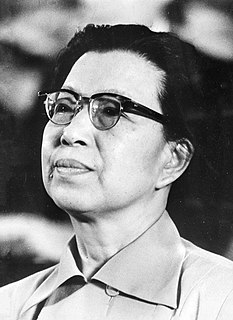
Jiang Qing, also known as Madame Mao, was a Chinese communist revolutionary, actress, and major political figure during the Cultural Revolution (1966–1976). She was the fourth wife of Mao Zedong, the Chairman of the Communist Party and Paramount leader of China. She used the stage name Lan Ping (藍蘋) during her acting career, and was known by many other names. She married Mao in Yan'an in November 1938 and served as the inaugural "First Lady" of the People's Republic of China. Jiang was best known for playing a major role in the Cultural Revolution and for forming the radical political alliance known as the "Gang of Four".
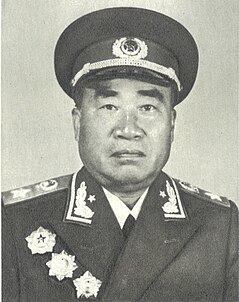
Zhu De was a Chinese general, military strategist, politician and revolutionary in the Chinese Communist Party. Born into poverty in 1886 in Sichuan, he was adopted by a wealthy uncle at age nine. His uncle provided him with a superior early education that led to his admission into a military academy. After graduating, he joined a rebel army and became a warlord. It was after this period that he adopted communism. Joining the Chinese Communist Party, he ascended through the ranks of the Chinese Red Army as it closed in on securing the nation in the Chinese Civil War. By the time China was under Mao's control, Zhu was a high-ranking official within the party. He served as commander-in-chief of the Eighth Route Army during the Second Sino-Japanese War. In 1955, he became one of the ten marshals of the People's Liberation Army, of which he is regarded as one of the principal founders. Zhu remained a prominent political figure until his death in 1976. As the chairman of the Standing Committee of the National People's Congress from 1975 to 1976, Zhu was the head of state of the People's Republic of China.
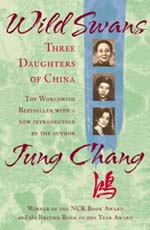
Wild Swans: Three Daughters of China is a family history that spans a century, recounting the lives of three female generations in China, by Chinese writer Jung Chang. First published in 1991, Wild Swans contains the biographies of her grandmother and her mother, then finally her own autobiography. Her grandmother had bound feet and was married off at a young age as the concubine of a high-status warlord. Chang's mother rose in status as a member of the Communist Party. Chang took part in the Cultural Revolution as a member of the Red Guards, but eventually her father was tortured and she was sent to the countryside for thought reform. Later, she earned a scholarship to study in England, where she still lives.
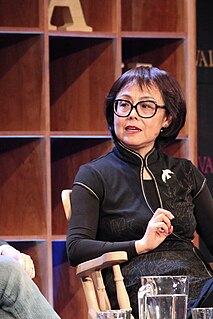
Xuē Xīnrán is a British-Chinese journalist, author, speaker, and advocate for women's issues. She was a popular radio personality in China with a call-in program named "Words on the Night Breeze" from 1989 to 1997. The program focused on women's issues and life stories. She was well known for travelling extensively in China to interview women for her work. In 1997, she moved to London and began writing stories of the women she met along her journeys. Her first book, The Good Women of China, was published in 2002, becoming an international bestseller. She frequently contributes to The Guardian and the BBC.
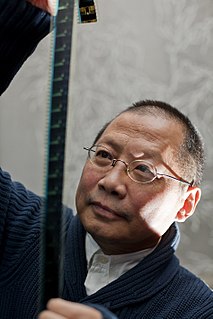
Dai Sijie is a Chinese French author and filmmaker.

Anchee Min or Min Anqi is a Chinese-American author who lives in San Francisco and Shanghai. Min has published two memoirs, Red Azalea and The Cooked Seed: A Memoir, and six historical novels. Her fiction emphasizes strong female characters, such as Jiang Qing, the wife of chairman Mao Zedong, and Empress Dowager Cixi, the last ruling empress of China.
Wang Li, born Wang Guangbin was a Chinese Communist propagandist and prominent member of the Cultural Revolution Group, in charge of overseeing the Cultural Revolution movement of Mao Zedong. Wang joined the Communist movement in his youth and became a specialist in theory and propaganda work. He was one of the leading figures of party propaganda at the outset of the Cultural Revolution, and contributed to the synthesis of Mao's theory of "continuous revolution."

Tao Zhiyue was a Chinese military officer and politician, lieutenant general of the National Revolutionary Army of the Republic of China, and a full general of the People's Liberation Army of the People's Republic of China.

Li Na, is the daughter of Mao Zedong and his fourth wife Jiang Qing, and their only child together. Her surname is Li rather than Mao, because her father used the pseudonym "Li Desheng" for a period of time during the Chinese Civil War.

Kang Keqing was a politician of the People's Republic of China, and the wife of Zhu De until his death in 1976.
Ting-Xing Ye is a Chinese- Canadian author of young adult novels, as well as Leaf In A Bitter Wind, a best-selling autobiographical account of her life in Maoist China.
Revolutionary committees were tripartite bodies established during Cultural Revolution in the People's Republic of China to facilitate government by the three mass organisations in China — the people, the PLA and the Party. They were originally established in the power-seizure movement as a replacement system of government to the old Party apparatus, but quickly became subordinate to it.
Eu Chooi Yip was a prominent member of the anti-colonial and Communist movements in Malaya and Singapore in the 1950s and 1960s. Eu Chooi Yip was born in Kuantan, Malaysia.
One Man's Bible is a novel by Gao Xingjian published in 1999 and in English translation in 2003. Set during the Cultural Revolution, the novel stars an alter-ego of Gao who reflects on his previous experiences around the world. Throughout the book, the chapters alternate between the narrator describing his life during and after his time in China during the Cultural Revolution. He describes how he looks for freedom and how to retain that freedom.

The Columbia Anthology of Modern Chinese Drama is a 2010 book edited and introduced by Xiaomei Chen and published by the Columbia University Press.
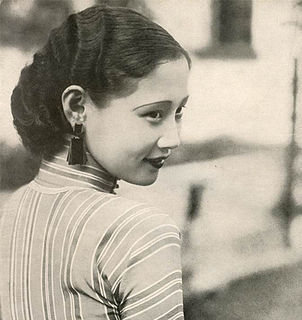
Xu Lai was a Chinese film actress, socialite, and World War II secret agent. Known as the "Standard Beauty", she was active in the film industry for only three years, and quit acting after the suicide of the great star Ruan Lingyu in 1935. Her first husband was Li Jinhui, the "Father of Chinese pop music".
Gao Xiaoyan is a disgraced major general in the People's Liberation Army of China. She successively served as political commissar and Discipline Inspection Secretary of the PLA Information Engineering University in Zhengzhou, and executive director of China Institute For Leadership Science (CILS). Investigated by the PLA's anti-graft agency in December 2014, She was the first female general to have been implicated in the anti-corruption campaign launched after the 18th Communist Party Congress.
Niu Weiyu is a Chinese photojournalist whose career started in the 1940s with coverage of the Chinese Communist Party's wartime experiences and continued after 1949. She is praised for her photographs of ordinary workers and ethnic groups, and as one of the few women in photography, she specialized in female images.
Gao Xiaoxia was a Chinese chemist and an academician of the Chinese Academy of Science. She held leadership positions at Peking University and in the Chinese Chemical Society. Her contributions to analytical chemistry, particularly the development of microanalytical techniques in polarography, were instrumental in supporting the research and production of rare earths.











